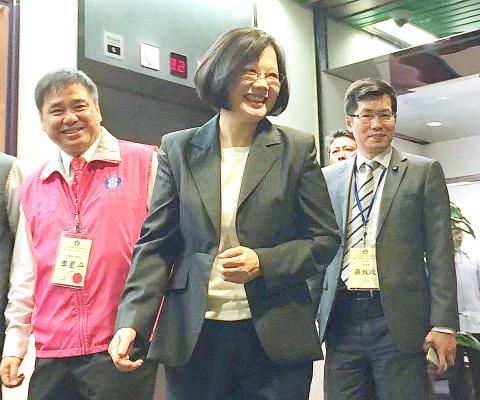Presidential Office spokesman Charles Chen (陳以信) on Friday confirmed that the nation had received an invitation from the WHO to send officials to its annual World Health Assembly (WHA), which is to be held in Geneva later this month, adding that it would be passed on to the new government under president-elect Tsai Ing-wen (蔡英文).
For the past seven years, the WHO has sent an invitation to Taiwan to attend the WHA as an observer under the name “Chinese Taipei.”
What is different this time is that the invitation mentioned UN Resolution No. 2758 and the “one China” principle, which is understood to mean that there is only “one China,” with Beijing interpreting that as the People’s Republic of China (PRC) encompassing Taiwan.

Photo: CNA
The resolution was passed on Oct. 25, 1971, and recognized the PRC as “the only legitimate representative of China to the UN,” expelling the representatives of the Republic of China (ROC).
This year’s meeting is to be held in Geneva from May 23 to May 28, shortly after the inauguration of Tsai on May 20.
Chen said President Ma Ying-jeou (馬英九) viewed the invitation in a positive light, believing it to be an extension of the so-called “1992 consensus,” which refers to a tacit understanding between the Chinese Nationalist Party (KMT) and the Chinese government that both sides of the Taiwan Strait acknowledge there is “one China,” with each side having its own interpretation of what “China” means.
Tsai and her Democratic Progressive Party (DPP) have never recognized the existence of such a consensus.
This year’s WHO invitation, for the first time doing so under the premise of the “one China” principle, is widely seen as the first challenge directed at Tsai.
The incoming administration has to decide by tomorrow, the last day of online registration for the WHA, if it wants to attend the conference.
On Friday, China’s Taiwan Affairs Office (TAO) spokesman Ma Xiaoguang (馬曉光) stressed China’s “clear and consistent” stance on Taiwan’s participation in the international community, which he said was that “reasonable arrangement will be made through cross-strait consultation under the ‘one China’ principle.”
Taiwan has been able to attend the WHA conference since 2009 as an observer in a “special arrangement” under the political basis of the “1992 consensus,” he said.
He added that as Taiwan has expressed a desire to attend the conference several times this year, China heeded the wish and made the arrangement in goodwill.
He said that if the “political basis” is to be destroyed, it would be hard to continue such an arrangement.
China has consistently obstructed Taiwan’s efforts to take part in international organizations, but lifted its objection to Taiwan’s bid to become a WHO observer less than a year after Ma Ying-jeou began his first presidential term in May 2008.

A magnitude 7.0 earthquake struck off Yilan at 11:05pm yesterday, the Central Weather Administration (CWA) said. The epicenter was located at sea, about 32.3km east of Yilan County Hall, at a depth of 72.8km, CWA data showed There were no immediate reports of damage. The intensity of the quake, which gauges the actual effect of a seismic event, measured 4 in Yilan County area on Taiwan’s seven-tier intensity scale, the data showed. It measured 4 in other parts of eastern, northern and central Taiwan as well as Tainan, and 3 in Kaohsiung and Pingtung County, and 2 in Lienchiang and Penghu counties and 1

FOREIGN INTERFERENCE: Beijing would likely intensify public opinion warfare in next year’s local elections to prevent Lai from getting re-elected, the ‘Yomiuri Shimbun’ said Internal documents from a Chinese artificial intelligence (AI) company indicated that China has been using the technology to intervene in foreign elections, including propaganda targeting Taiwan’s local elections next year and presidential elections in 2028, a Japanese newspaper reported yesterday. The Institute of National Security of Vanderbilt University obtained nearly 400 pages of documents from GoLaxy, a company with ties to the Chinese government, and found evidence that it had apparently deployed sophisticated, AI-driven propaganda campaigns in Hong Kong and Taiwan to shape public opinion, the Yomiuri Shimbun reported. GoLaxy provides insights, situation analysis and public opinion-shaping technology by conducting network surveillance

‘POLITICAL GAME’: DPP lawmakers said the motion would not meet the legislative threshold needed, and accused the KMT and the TPP of trivializing the Constitution The Legislative Yuan yesterday approved a motion to initiate impeachment proceedings against President William Lai (賴清德), saying he had undermined Taiwan’s constitutional order and democracy. The motion was approved 61-50 by lawmakers from the main opposition Chinese Nationalist Party (KMT) and the smaller Taiwan People’s Party (TPP), who together hold a legislative majority. Under the motion, a roll call vote for impeachment would be held on May 19 next year, after various hearings are held and Lai is given the chance to defend himself. The move came after Lai on Monday last week did not promulgate an amendment passed by the legislature that

Taiwan is gearing up to celebrate the New Year at events across the country, headlined by the annual countdown and Taipei 101 fireworks display at midnight. Many of the events are to be livesteamed online. See below for lineups and links: Taipei Taipei’s New Year’s Party 2026 is to begin at 7pm and run until 1am, with the theme “Sailing to the Future.” South Korean girl group KARA is headlining the concert at Taipei City Hall Plaza, with additional performances by Amber An (安心亞), Nick Chou (周湯豪), hip-hop trio Nine One One (玖壹壹), Bii (畢書盡), girl group Genblue (幻藍小熊) and more. The festivities are to